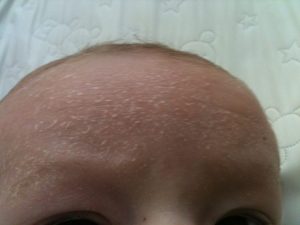
From Barbara Robertson:
Many of our families are told by well meaning health care professionals (or family or friends or social media…) that they need to eliminate dairy from their diet to cure fussiness and gas, basically a variety of normal newborn behaviors. Newborn babies are almost always fussy and gassy!
Eliminating cow’s milk from a person’s diet is not easy. Parent’s are often overwhelmed as it is by just having a new born baby. The idea of reading lots of labels and having to find alternatives to foods containing dairy can push them over the edge.
The myths
Families are not only told they have to eliminate dairy for reasons that may or may not be true but they are told it takes at least two weeks to get the dairy out of their body. Then they are told it takes TWO MORE weeks to have it leave the baby’s body until they know for sure what is going on. Some groups say this process can take eight weeks. Yikes!
Some families are even told they need to wean from nursing because of a suspected cow milk protein allergy. But then what are you going to feed your baby? Most infant formula’s are cow milk protein based. Yes, you can find some not perfect solutions but they have their own drawbacks. We need to keep this in mind when we are questioning how the baby may be reacting to a parent’s milk.
 The facts
The facts
We know that food proteins do enter human milk. But when are they are they a problem and when are they not? How can we sort out what might be a real cow milk protein allergy vs. normal newborn behavior?
We also know that a small study showed lactating individuals who ingested milk prior to being dairy-free, found cow’s milk protein concentration peaked at 2 hours post-ingestion and was undetectable at 6 hours. 6 hours? Not weeks and weeks?
The Journal of Pediatric Gastroenterology and Nutrition reports “for an immediate reaction the maternal elimination diet needs to be maintained for only 3 to 6 days. If delayed reactions are suspected (such as allergic proctocolitis which can cause bloody stool), then the diet should be continued for up to 14 days. If there is no improvement, then it is likely that diagnoses other than CMPA are the cause of the symptoms and the child should be further evaluated.” This is different than a brand new position paper which reports “Over-diagnosis of Cow Milk Allergy occurs much more frequently than under-diagnosis; both have potentially harmful consequences. Therefore, the necessity of a challenge test after a short diagnostic elimination diet of 2-4 weeks is recommended as the cornerstone of the diagnosis.” Their definition of “short” seems long to me and it seems that the severity of symptoms play a role in how long the elimination diet needs to be.
 In Breastfeeding Answers, 2nd Edition by Nancy Mohrbacher, Nancy discusses the idea of looking for not just behavior symptoms but also physical symptoms such as eczema or blood in the baby’s stools. If we have a very fussy baby, especially if the symptoms are getting worse instead of better, AND physical symptoms, it can be well worth taking to their health care provider and putting in the effort of an elimination diet.
In Breastfeeding Answers, 2nd Edition by Nancy Mohrbacher, Nancy discusses the idea of looking for not just behavior symptoms but also physical symptoms such as eczema or blood in the baby’s stools. If we have a very fussy baby, especially if the symptoms are getting worse instead of better, AND physical symptoms, it can be well worth taking to their health care provider and putting in the effort of an elimination diet.
In my clinical work of 25 years, all of the families where the infant did have a cow’s milk protein allergy, found tremendous improvement of symptoms with elimination diets in a matter of days. Not many, many weeks. Certainly not months.
Yes, cow milk protein allergies are real. But let’s help our families sort out truth from myth.
If you work with breast/chestfeeding families and are passionate about lactation support OR you want to turn your passion for nursing into professional practice, check out LactaLearning.com and consider following us on social media!
Instagram @lacta.learning
Facebook LactaLearning
